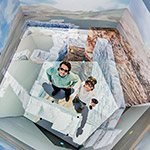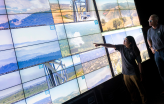Disease Without Borders
In a paper published this week online in Global Society, researchers with University of California, San Diego School of Medicine and the Urban Studies and Planning Program, also at UC San Diego, present a bioregional guide that merges place-based (territorial) city planning and ecosystem management along the United States-Mexico border as way to improve human and environmental health.










